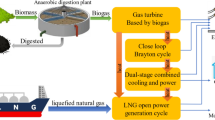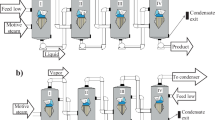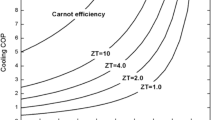Abstract
A theoretical performance analysis based on the exergetic performance coefficient (EPC) criterion has been carried out for a cascade refrigeration system for different refrigerant couples. The EPC criterion is defined as the ratio of exergy output to the total exergy destruction rate (or loss rate of availability). According to the results of the study, the refrigerant couples R23-R717 show the best performance in terms of EPC and coefficient of performance from among the other refrigerant couples (R23-R290, R23-R404A, R23-R507A and R23-R717). In the analysis, R23 was used for the lower temperature cycle and the other refrigerants are used for the higher temperature cycle. The effects of the temperature difference in the cascade condenser and the evaporator and condenser temperature on the EPC, coefficient of performance and exergy destructions have been thoroughly investigated for the refrigerant couple R23-R717.

Similar content being viewed by others
Abbreviations
- COP:
-
Coefficient of performance
- Ė x :
-
Exergy rate (kW)
- e X :
-
Specific exergy (kj/kg)
- ĖxD :
-
Exergy destruction rate (kW)
- EPC:
-
Exergetic performance coefficient
- h:
-
Specific enthalpy (kj/kg)
- i :
-
ith component
- in:
-
Input
- ṁ :
-
Mass flow rate of the refrigerant (kg/s)
- out:
-
Output
- \({\dot{Q}}\) :
-
Rate of heat transfer (kW)
- s :
-
Specific entropy (kj/kgK)
- T :
-
Temperature (K)
- VCR:
-
Vapor compression refrigerator
- ẇ :
-
Electrical power input (kW)
- x:
-
Quality
- ε :
-
Exergy efficiency
- η :
-
Efficiency
- ci:
-
Isentropic compressor
- comp:
-
Compressor
- cond:
-
Condenser
- cs:
-
Cooled space
- em:
-
Electrical
- exva:
-
Expansion valve
- evap:
-
Evaporator
- m:
-
Mechanical
- tot:
-
Total
- 0:
-
Environment conditions
- Cascon:
-
Cascade condenser
- LTC:
-
Low-temperature cycle
- HTC:
-
High-temperature cycle
- *:
-
Maximum EPC conditions
- PH:
-
Physical
References
Cengel, Y.A.; Boles, M.A.: Thermodynamics: An Engineering Approach, 5th Ed. pp. 616–620, USA, McGraw-Hill (2006)
Halimic E., Ross E., Agnew B., Anderson A., Pottes I.: A comparison of the operating performance of alternative refrigerants. Appl. Thermal Eng., 23, 1441–1451 (2003)
SpatZ M.W., Motta S.F.Y.: An evaluation of options for replacing HCFC-22 in medium temperature refrigeration systems. Int. J. Refrig. 27, 475–483 (2004)
Xuan Y., Chen G.: Experimental study on HFC-161 mixture as an alternative refrigerant to R502. Int. J. Refrig. 28, 436–441 (2005)
Fatouh M., El Kafafy M.: of propane/commercial butane mixtures as possible alternatives to R134a in domestic refrigerators. Energy Convers. Manag. 47, 2644–2658 (2006)
Han X.H., Wang Q., Zhu Z.W., Chen G.M.: Cycle performance study on R32/R125/R161 as an alternative refrigerant to R407C. Appl. Thermal Eng. 27, 2559–2565 (2007)
Mani K., Selladurai V.: Experimental analysis of a new refrigerant mixture as drop-in replacement for CFC12 and HFC134a. Int. J. Thermal Sci. 47, 1490–1495 (2008)
Kilicarslan A., Hosoz M.: Energy and irreversibility analysis of a cascade refrigeration system for various refrigerant couples. Energy Convers. Manag. 51, 2947–2954 (2010)
Niu B., Zhang Y.: Experimental study of the refrigeration cycle performance for the R744/R290 mixtures. Int. J. Refrig. 30, 37–42 (2007)
Rezayan O., Behbahaninia A.: A Thermoeconomic optimization and exergy analysis of CO2/NH3 cascade refrigeration systems. Energy, 36, 888–895 (2011)
Dopazo J.A., Seara J.F., Sieres J., Uhía F.J.: Theoretical analysis of a CO2–NH3 cascade refrigeration system for cooling applications at low temperatures. Appl. Thermal Eng. 29, 1577–1583 (2009)
Parekh A.D., Tailor P.R.: Thermodynamic analysis of R507A-R23 cascade refrigeration system. World Acad. Sci. Eng. Technol. 57, 992–996 (2011)
Getu H.M., Bansal P.K.: Thermodynamic analysis of an R744–R717 cascade refrigeration system. Int. J. Refrig. 31, 45–54 (2008)
Bansal P.K., Jain S.: Cascade systems: past, present, and future. ASHRAE Trans 11(1), 245–252 (2007)
Lee T.S., Liu C.H., Chen T.W.: Thermodynamic analysis of optimal condensing temperature of cascade-condenser in CO2/NH3 cascade refrigeration systems. Int. J. Refrig. 29, 1100–1108 (2006)
Ust, Y.; Akkaya, A.V.; Safa, A.: Analysis of a vapor compression refrigeration system via exergetic performance coefficient (EPC) criterion. J. Energy Inst. 84, 2 (2011)
Aprea C., Renno C., Safa A.: Experimental comparison of R22 with R417A performance in a vapour compression refrigeration plant subjected to a cold store. Energy Convers. Manag. 45, 1807–1819 (2004)
Kotas T.J.: The Exergy Method Of Thermal Plant Analysis. Butterworths, London (1985)
Kabul A., Kizilkan O., Yakut K.A.: Performance and exergetic analysis of vapor compression refrigerator system with an internal heat exchanger using a hydrocarbon, isobutane (R600a). Int. J. Energy Res. 32, 32–824 (2008)
Morosuk, T.; Tsatsaronis, T.; Schult, M.: Conventional and advanced exergetic analyses: theory and application. Arab. J. Sci. Eng. 38, 2 (2013)
Bejan A., Tsatsaronis G., Moran M.: Thermal Design and Optimization. Wiley, New York (1996)
Designation and safety classification of refrigerants. ASHRAE Handbook-Fundamentals, Ch. 29 (2009)
Author information
Authors and Affiliations
Corresponding author
Rights and permissions
About this article
Cite this article
Ust, Y., Karakurt, A.S. Analysis of a Cascade Refrigeration System (CRS) by Using Different Refrigerant Couples Based on the Exergetic Performance Coefficient (EPC) Criterion. Arab J Sci Eng 39, 8147–8156 (2014). https://doi.org/10.1007/s13369-014-1335-9
Received:
Accepted:
Published:
Issue Date:
DOI: https://doi.org/10.1007/s13369-014-1335-9




